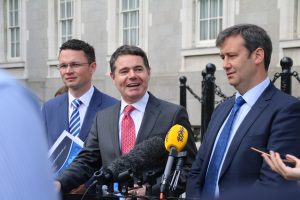Expenditure Report facilitates enhanced Oireachtas engagement while Spending Review will ensure better value for taxpayer
The Minister for Finance and Public Expenditure & Reform, Paschal Donohoe T.D., has today (Thursday) published the Mid-Year Expenditure Report (MYER) for 2017. The Report, along with the National Economic Dialogue and the Summer Economic Statement, is an integral part of the reformed budget process.
Following on from the Summer Economic Statement – which set out the broad fiscal parameters for Budget 2018 and which was published last week – this Report presents the baseline for Departmental expenditure and provides the starting point for examination of budgetary priorities by the Oireachtas.
The MYER sets out an analysis of the fiscal consolidation that was required over the period 2008 to 2014 to return stability to the public finances. Taking into account the lessons of the past, the focus of public expenditure policy is to provide for ongoing sustainable increases in expenditure for the delivery of public services. A key consideration is that the level of resources allocated is affordable, both now and in the future, in order to guard against the risk of a return to the type of inflated spending, followed by severe consolidation that was required subsequently.
Given this context, on Budget Day last year, Minister Donohoe announced that a review of day-to-day Government spending would take place in advance of Budget 2018. The 2017 Spending Review is the first in a series of rolling, selective reviews, which will cover the totality of Government spending over a three year period to 2019. The MYER provides a summary of the rationale and methodology behind the Spending Review.
This is a new approach to reviewing expenditure, which is informed by lessons learned in previous reviews* and is tailored to reflect the changed fiscal, economic and political landscape. The results of the first year of this new approach are published with the MYER.
Minister Donohoe said: ‘There is an increasing tendency at budget time each year to focus on the ‘additional’ or incremental increases available, the so-called ‘fiscal space’. However, this ‘extra’ is always only a small fraction of what we are already doing, and of the expenditure allocated to provide the totality of public services that we all depend on’.
“The Spending Review process allows for systematic examination of existing spending programmes to assess their effectiveness in meeting policy objectives and also to identify scope for re-allocating funding to meet expenditure priorities. In this way, we can keep our focus on the totality of Government expenditure and ensure that we are achieving the best possible value for the taxpayer.”
The papers prepared for the Spending Review cover a wide range of policy areas and account for a significant proportion of current expenditure. Work on the 2017 Spending Review began in January and 18 papers have been produced by officials in the Department of Public Expenditure and Reform, as well as other Departments.
Minister Donohoe concluded: “The results of the Review analysis will support budgetary decisions and facilitate the consideration of existing expenditure alongside budgetary proposals. From a longer-term perspective, the Spending Review also represents a crucial next step in broadening and deepening the knowledge of a range of complex policy areas. This will facilitate future discussions regarding the evolution of Government expenditure and should add a more multi-annual perspective on expenditure trends and the sustainability of spending into the future.”
Notes to Editors
*This approach is in keeping with other recent reforms, notably the expanded Irish Government Economic and Evaluation Service (IGEES) and Action 22 of the Civil Service Renewal Plan which highlights the need to strengthen policy making skills. The approach taken to Spending Review 2017 was also informed by the IGEES paper ‘Spending Reviews in Ireland: Lessons for the Future.’ Further information on the 2017 Spending Review and the 18 Spending Review papers is available here.
